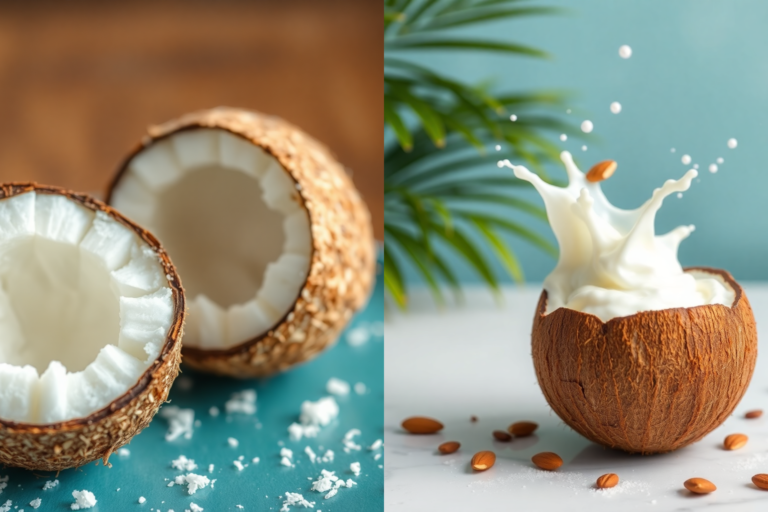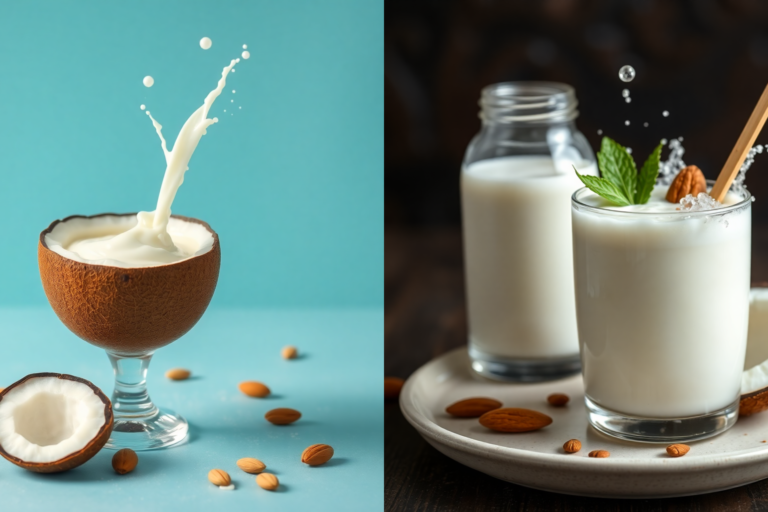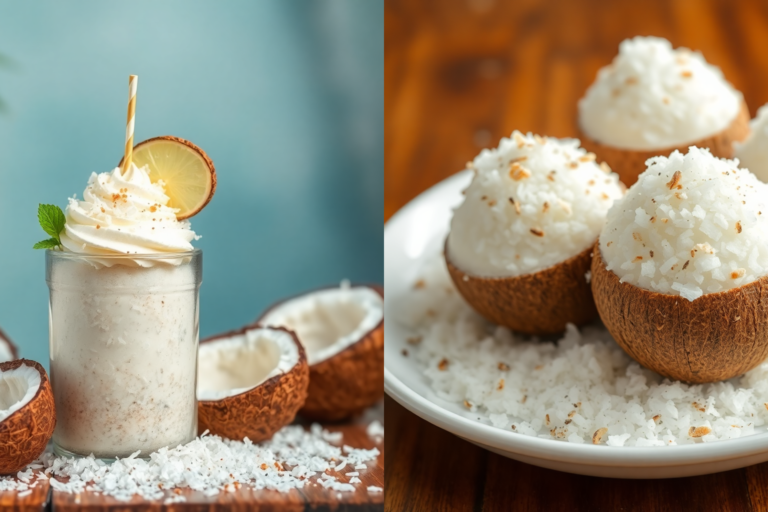Introduction of Desiccated Coconut
Desiccated coconut is a dried, finely grated form of the white flesh of mature coconuts. It is a popular ingredient used in a wide range of culinary traditions and health food preparations due to its rich texture, mildly sweet flavor, and impressive nutritional profile. This versatile ingredient can be found in many pantries around the world, prized not only for its taste but also for its numerous health benefits.
Brief Introduction to Desiccated Coconut
Desiccated coconut is created by removing the moisture from the grated flesh of mature coconuts, resulting in a dry, flaky product that retains all the natural flavor and nutrients of the coconut. This process ensures a longer shelf life and makes desiccated coconut an ideal pantry staple for various culinary uses. Unlike fresh coconut, desiccated coconut is lightweight and easy to store, making it a convenient option for both home cooks and professional chefs.
Overview of Its Popularity in Various Cuisines and Health Foods
Desiccated coconut has gained popularity in a variety of global cuisines and health food preparations. Its versatility and nutrient-rich composition make it a favorite ingredient in both sweet and savory dishes. Here’s a closer look at its widespread use:
In Baking and Desserts: Desiccated coconut is a common ingredient in baking, adding texture and flavor to cakes, cookies, and pastries. It is also used to decorate desserts like cakes and truffles, providing a delightful crunch and coconutty taste.
In Asian and Indian Cuisines: In many Asian and Indian recipes, desiccated coconut is used to enhance the flavor of curries, chutneys, and rice dishes. It adds a unique taste and texture, complementing the spices and other ingredients.
In Smoothies and Breakfast Foods: Health-conscious individuals often add desiccated coconut to smoothies, yogurt, and oatmeal for an extra boost of flavor and nutrition. It’s a great way to start the day with a healthy and delicious meal.
In Health Bars and Snacks: Desiccated coconut is a popular ingredient in energy bars, granola, and trail mixes. Its natural sweetness and rich nutrient content make it a perfect addition to these healthy snacks.
In Vegan and Gluten-Free Recipes: As a plant-based ingredient, desiccated coconut is widely used in vegan and gluten-free recipes. It serves as a substitute for flour in certain baked goods and as a base for dairy-free milks and creams.
The widespread use of desiccated coconut in various cuisines and health foods highlights its versatility and the growing recognition of its health benefits. From traditional dishes to modern health food creations, desiccated coconut continues to be a beloved ingredient in kitchens worldwide.
Health Benefit 1: Rich in Dietary Fiber
Importance of Dietary Fiber in Digestion
Dietary fiber is crucial for maintaining a healthy digestive system. Found in plant-based foods, fiber is the part of plants that the body cannot digest. It passes through the digestive system, adding bulk to the stool and facilitating its movement through the intestines. There are two types of dietary fiber: soluble and insoluble. Soluble fiber dissolves in water and can help lower glucose levels and blood cholesterol, while insoluble fiber does not dissolve in water and helps food pass more quickly through the stomach and intestines.
Desiccated coconut is particularly rich in insoluble fiber, which plays a key role in promoting regular bowel movements. This type of fiber absorbs water as it moves through the digestive tract, making the stool bulkier and softer, thus easier to pass. This process helps prevent constipation and ensures that the digestive system operates smoothly and efficiently.
How Desiccated Coconut Aids in Regular Bowel Movements
Desiccated coconut is an excellent source of dietary fiber, containing about 9 grams of fiber per 100 grams. The high fiber content in desiccated coconut can significantly contribute to daily fiber intake, aiding in the maintenance of regular bowel movements.
When consumed, the fiber in desiccated coconut adds bulk to the stool, which helps to move it more swiftly and easily through the intestines. This increased bulk stimulates the walls of the intestines, promoting peristalsis—the wave-like muscle contractions that push food through the digestive tract.
Additionally, the fiber in desiccated coconut helps retain water in the stool, making it softer and easier to pass. This is particularly beneficial for individuals who suffer from constipation or irregular bowel movements, as it helps to normalize bowel function and prevent discomfort associated with straining.
Impact on Overall Digestive Health
Regular consumption of desiccated coconut can have a profound positive impact on overall digestive health. By ensuring regular bowel movements, desiccated coconut helps to prevent common digestive issues such as constipation, hemorrhoids, and diverticulitis. Furthermore, maintaining regular bowel movements can reduce the risk of developing more serious conditions like colorectal cancer.
The fiber in desiccated coconut also plays a role in maintaining a healthy gut microbiome. Dietary fiber acts as a prebiotic, feeding the beneficial bacteria in the gut. These bacteria are essential for a healthy digestive system as they aid in the breakdown of food, the production of certain vitamins, and the prevention of harmful pathogens from colonizing the gut.
In summary, incorporating desiccated coconut into your diet can greatly enhance your digestive health. Its high fiber content ensures regular bowel movements, reduces the risk of digestive disorders, and promotes a healthy gut microbiome. By making desiccated coconut a regular part of your diet, you can enjoy these digestive health benefits and contribute to your overall well-being.
Health Benefit 2: High in Healthy Fats
Desiccated coconut is a rich source of healthy fats, particularly medium-chain triglycerides (MCTs), which have numerous benefits for energy, metabolism, and weight management.
Explanation of Medium-Chain Triglycerides (MCTs) Found in Desiccated Coconut
Medium-chain triglycerides (MCTs) are a type of fat found in high concentrations in desiccated coconut. Unlike long-chain fatty acids, MCTs have a shorter chain length, which affects how the body processes them.
- Structure of MCTs: MCTs have between 6 and 12 carbon atoms, making them shorter than long-chain fatty acids, which have 14 or more carbon atoms. The primary MCTs found in desiccated coconut include caprylic acid (C8), capric acid (C10), and lauric acid (C12).
- Absorption and Metabolism: Due to their shorter chain length, MCTs are rapidly absorbed in the digestive tract and transported directly to the liver, where they are quickly converted into energy rather than being stored as fat.
Benefits of MCTs for Energy and Metabolism in Desiccated Coconut
The MCTs in desiccated coconut provide a quick and efficient source of energy, which has several metabolic benefits.
- Quick Energy Source: Because MCTs are rapidly metabolized by the liver, they provide an immediate source of energy. This is particularly beneficial for individuals who need a quick energy boost, such as athletes or those experiencing fatigue.
- Enhanced Metabolism: MCTs can increase the body’s metabolic rate. Studies have shown that consuming MCTs can lead to a higher rate of calorie burning, which can support weight loss and maintenance.
- Improved Cognitive Function: The rapid conversion of MCTs into ketones (an alternative energy source for the brain) can enhance cognitive function, making desiccated coconut a valuable addition to the diet for mental clarity and focus.
Role of Desiccated Coconut in Weight Management
Including desiccated coconut in the diet can play a significant role in weight management due to its high content of MCTs.
- Increased Satiety: MCTs in desiccated coconut can increase feelings of fullness and satiety, reducing overall calorie intake. This can be particularly helpful for those trying to manage their weight or reduce snacking between meals.
- Fat Oxidation and Weight Loss: The consumption of MCTs has been linked to increased fat oxidation, meaning the body is more likely to burn fat for energy. This can lead to a reduction in body fat over time.
- Maintaining Lean Muscle Mass: By providing a quick energy source, MCTs can help preserve lean muscle mass during weight loss efforts. This is crucial for maintaining a healthy metabolism, as muscle tissue burns more calories than fat tissue.
Desiccated coconut, with its high concentration of MCTs, is a nutritious addition to a balanced diet, supporting both energy levels and weight management. Its unique fatty acid profile not only provides immediate energy but also aids in enhancing metabolic functions and promoting fat loss, making it a valuable ingredient for those looking to improve their overall health and fitness.
Health Benefit 3: Boosts Immune System with Desiccated Coconut
Presence of Lauric Acid in Desiccated Coconut
Desiccated coconut, a nutrient-dense form of coconut, contains a substantial amount of lauric acid. Lauric acid is a medium-chain fatty acid that constitutes nearly 50% of the total fat content in desiccated coconut. This specific fatty acid is one of the key components that contribute to the immune-boosting properties of desiccated coconut. Lauric acid is unique in its ability to support the body’s defense mechanisms and contribute to overall immune health.
How Lauric Acid Converts to Monolaurin in the Body
When consumed, lauric acid from desiccated coconut undergoes a transformation in the body. It is metabolized and converted into a compound called monolaurin. This conversion occurs primarily in the digestive system. Monolaurin is a more active form of lauric acid with enhanced antimicrobial properties.
- Conversion Process: The conversion of lauric acid into monolaurin begins in the gastrointestinal tract, where it is processed and absorbed. Once absorbed into the bloodstream, monolaurin is distributed throughout the body.
- Role of Monolaurin: Monolaurin is known for its potent ability to disrupt the lipid membranes of pathogens. It essentially neutralizes harmful microorganisms by attacking their cell membranes, making it a powerful agent in the immune system’s arsenal.
Monolaurin’s Role in Fighting Viruses and Bacteria
The conversion of lauric acid from desiccated coconut into monolaurin plays a crucial role in enhancing the body’s ability to combat infections. Monolaurin is effective against a range of pathogens, including bacteria, viruses, and fungi.
- Antibacterial Properties: Monolaurin exhibits strong antibacterial effects by targeting the lipid layers of bacterial cell membranes. This disrupts the bacteria’s ability to survive and replicate, thus aiding in the prevention and management of bacterial infections.
- Antiviral Effects: Similarly, monolaurin has been shown to have antiviral properties. It interferes with the ability of viruses to enter and infect host cells, thereby reducing the likelihood of viral infections and supporting overall immune defense.
- Impact on Overall Immunity: By including desiccated coconut in your diet, you provide your body with a natural source of monolaurin, which bolsters your immune system’s response to infections. This can be particularly beneficial in maintaining health during cold and flu season or when the body is under stress.
In summary, desiccated coconut contributes significantly to immune health through its content of lauric acid, which is converted into the potent antimicrobial compound monolaurin. This compound enhances the body’s ability to fight off harmful bacteria and viruses, making desiccated coconut a valuable addition to your diet for supporting a robust immune system.
Health Benefit 4: Desiccated Coconut Supports Heart Health
Heart-Friendly Fats in Desiccated Coconut
Desiccated coconut is a rich source of healthy fats that are beneficial for heart health. These fats primarily include medium-chain triglycerides (MCTs) and saturated fats. While saturated fats are often viewed with suspicion, the specific type found in desiccated coconut has been shown to have heart-friendly properties. MCTs in desiccated coconut are metabolized differently from long-chain fatty acids. They are rapidly absorbed and converted into energy, which can help improve overall lipid profiles and support heart health.
Impact on Cholesterol Levels
Desiccated coconut can positively influence cholesterol levels, contributing to cardiovascular health. Unlike some saturated fats, the saturated fats in desiccated coconut have been found to increase levels of high-density lipoprotein (HDL) cholesterol, commonly known as “good” cholesterol. HDL cholesterol helps to remove low-density lipoprotein (LDL) cholesterol, or “bad” cholesterol, from the bloodstream. By elevating HDL levels and maintaining or even reducing LDL levels, desiccated coconut helps to create a more favorable cholesterol balance, which can reduce the risk of developing heart disease.
Regular consumption of desiccated coconut can also help maintain a healthy balance of cholesterol levels, preventing the build-up of arterial plaque and reducing the risk of conditions such as atherosclerosis, heart attacks, and strokes.
Contribution to Overall Cardiovascular Health
The heart-healthy fats in desiccated coconut contribute to overall cardiovascular health in several ways. The medium-chain triglycerides (MCTs) in desiccated coconut not only help in improving cholesterol levels but also support a healthy metabolism and reduce inflammation. Reducing inflammation is crucial for maintaining healthy blood vessels and preventing cardiovascular diseases.
Furthermore, the saturated fats in desiccated coconut may help in stabilizing blood sugar levels, which is another important aspect of cardiovascular health. Stable blood sugar levels reduce the risk of developing conditions such as diabetes, which can have a detrimental impact on heart health.
In summary, desiccated coconut supports heart health through its heart-friendly fats, which positively affect cholesterol levels and contribute to overall cardiovascular wellness. Including desiccated coconut in your diet can be a simple yet effective way to support a healthy heart and reduce the risk of heart disease.
Health Benefit 5: Rich in Essential Nutrients
Desiccated coconut, with its rich nutritional profile, provides a range of essential vitamins and minerals that support overall health and well-being. This dried form of coconut is more than just a flavorful addition to meals; it offers several key nutrients that play crucial roles in maintaining bodily functions and promoting long-term health.
Overview of Key Vitamins and Minerals in Desiccated Coconut
Desiccated coconut is an excellent source of various essential nutrients, including:
- Iron: Desiccated coconut contains a moderate amount of iron, a vital mineral that is crucial for the formation of hemoglobin in red blood cells. Iron helps in the transport of oxygen throughout the body and prevents anemia.
- Copper: Copper is another important mineral found in desiccated coconut. It plays a significant role in the production of red blood cells, supports iron absorption, and helps in maintaining healthy connective tissues and a strong immune system.
- Selenium: Desiccated coconut is also rich in selenium, an essential trace element with antioxidant properties. Selenium helps protect cells from oxidative stress, supports thyroid function, and contributes to a healthy immune system.
Benefits of These Nutrients for Overall Health and Well-Being
Iron:
- Supports Oxygen Transport: Iron is crucial for the production of hemoglobin, which carries oxygen from the lungs to various tissues and organs in the body. Adequate iron levels are essential for preventing fatigue and maintaining energy levels.
- Prevents Anemia: Consuming desiccated coconut as part of a balanced diet can help prevent iron-deficiency anemia, characterized by symptoms such as weakness, dizziness, and shortness of breath.
Copper:
- Enhances Iron Absorption: Copper works synergistically with iron to improve its absorption and utilization in the body. This is particularly beneficial for maintaining healthy iron levels.
- Supports Immune Function: Copper plays a role in the production and maintenance of immune cells, helping the body fend off infections and diseases.
- Promotes Healthy Connective Tissue: Copper is involved in the synthesis of collagen and elastin, which are important for maintaining skin elasticity, joint health, and overall connective tissue integrity.
Selenium:
- Provides Antioxidant Protection: Selenium acts as a powerful antioxidant, neutralizing free radicals that can cause cellular damage and contribute to chronic diseases.
- Supports Thyroid Function: Selenium is essential for the proper functioning of the thyroid gland, which regulates metabolism, growth, and development.
- Enhances Immune System: Adequate selenium levels help strengthen the immune system, making it more effective in combating infections and illnesses.
How Regular Consumption of Desiccated Coconut Can Help Meet Nutritional Needs
Incorporating desiccated coconut into your diet can be a delicious and effective way to meet your nutritional needs. Here’s how regular consumption can benefit you:
- Balanced Nutrient Intake: Adding desiccated coconut to your diet helps provide a balance of essential nutrients, contributing to overall health and wellness. It complements other foods to ensure that you receive a wide range of vitamins and minerals necessary for optimal functioning.
- Convenient Source of Nutrients: Desiccated coconut is a convenient way to boost your intake of iron, copper, and selenium without needing to rely on supplements or fortified foods. Its versatility makes it easy to include in various recipes and meals.
- Supports Overall Health: By including desiccated coconut in your regular diet, you help support critical bodily functions such as oxygen transport, immune defense, and antioxidant protection. This can lead to improved energy levels, better immune response, and a reduced risk of chronic diseases.
In summary, desiccated coconut is a nutrient-dense food that offers significant health benefits. Its rich content of iron, copper, and selenium plays an essential role in maintaining good health, supporting various bodily functions, and preventing nutritional deficiencies. Incorporating desiccated coconut into your diet is an easy and enjoyable way to enhance your overall well-being.
Conclusion
Recap of the Top Health Benefits of Desiccated Coconut
Desiccated coconut stands out as a nutritious addition to your diet, offering a variety of health benefits. First and foremost, desiccated coconut is an excellent source of dietary fiber, which supports healthy digestion by promoting regular bowel movements and improving overall gut health. The medium-chain triglycerides (MCTs) found in desiccated coconut are a type of healthy fat that can enhance energy levels, support a healthy metabolism, and assist in weight management. Additionally, desiccated coconut contains lauric acid, which converts to monolaurin in the body and provides significant immune-boosting properties by fighting off harmful viruses and bacteria. The heart-friendly fats in desiccated coconut contribute to cardiovascular health by balancing cholesterol levels, while its rich nutrient profile, including essential vitamins and minerals like iron, copper, and selenium, supports overall well-being.
Encouragement to Include Desiccated Coconut in a Balanced Diet
Given its diverse health benefits, incorporating desiccated coconut into a balanced diet is a simple and effective way to enhance your nutritional intake. Its fiber content aids in digestion, while MCTs provide a quick energy boost and help manage weight. The immune-boosting lauric acid and heart-healthy fats further contribute to overall health. To maximize these benefits, consider making desiccated coconut a regular part of your meals. Its versatility and nutrient density make it an excellent choice for those seeking to improve their diet.
Tips for Incorporating Desiccated Coconut into Daily Meals
Smoothies and Shakes: Add a tablespoon of desiccated coconut to your favorite smoothie or protein shake. It enhances texture and flavor while providing additional fiber and nutrients.
Oatmeal and Yogurt: Sprinkle desiccated coconut over your morning oatmeal or yogurt. This not only adds a delightful crunch but also boosts the nutritional profile of your breakfast.
Baking: Use desiccated coconut in baking recipes such as muffins, cookies, or energy bars. It complements both sweet and savory recipes, adding a unique flavor and nutritional boost.
Salads and Grain Bowls: Incorporate desiccated coconut into salads or grain bowls for added texture and a hint of sweetness. It pairs well with both fresh greens and hearty grains.
Homemade Granola: Mix desiccated coconut into homemade granola for a chewy texture and extra nutrients. It’s a great way to enjoy a healthy, homemade snack.
By integrating desiccated coconut into your daily meals, you can enjoy its numerous health benefits while adding variety and flavor to your diet. Embrace this versatile ingredient and reap the rewards of its rich nutritional profile.











